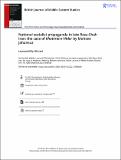Files in this item
National socialist propaganda in late Reza-Shah Iran : the case of Khaterat-e Hitler by Mohsen Jahansuz
Item metadata
| dc.contributor.author | Michael, Leonard | |
| dc.date.accessioned | 2021-07-14T12:30:01Z | |
| dc.date.available | 2021-07-14T12:30:01Z | |
| dc.date.issued | 2021-07-01 | |
| dc.identifier | 274711800 | |
| dc.identifier | 8da6b58e-9f34-489c-a4b4-46b868a7fbba | |
| dc.identifier | 000669122900001 | |
| dc.identifier | 85109702553 | |
| dc.identifier.citation | Michael , L 2021 , ' National socialist propaganda in late Reza-Shah Iran : the case of Khaterat-e Hitler by Mohsen Jahansuz ' , British Journal of Middle Eastern Studies , vol. Latest Articles . https://doi.org/10.1080/13530194.2021.1945430 | en |
| dc.identifier.issn | 1353-0194 | |
| dc.identifier.uri | https://hdl.handle.net/10023/23553 | |
| dc.description | The author gratefully acknowledges the financial support received from the German Academic Scholarship Foundation, the Scottish Graduate School for Arts and Humanities and the St Leonards College of the University of St Andrews. | en |
| dc.description.abstract | The attempts of national socialist Germany to influence the Iranian public are an important dimension of the relations between the two countries during the last years of Reza Shah’s rule. Yet previous studies on this aspect have barely considered Iranian sources to assess the actual impact of these propaganda efforts on Iranian society. One of these sources is the 1938-published Khaterat-e Hitler by Mohsen Jahansuz. By analysing the book in depth and situating it within the context of Jahansuz’s biography, this study provides new findings concerning the reception of national socialist ideology in 1930s Iran and challenges previous claims concerning the publication, which has hitherto been considered the first translation of Adolf Hitler’s Mein Kampf. It argues that Jahansuz, by inserting his own ideas and interpretations into the text without explicitly indicating his authorship, did not create a translation but an adaptation of the German original that transcended the limits of Hitler’s exclusivist Germanocentrism in order to establish a theory of the ‘racial superiority’ of the rural population at Iran’s mountainous periphery. The paper shows how a representative of the Iranian literati appropriated national socialist ideology and distributed it in an altered way to further his own cause. | |
| dc.format.extent | 20 | |
| dc.format.extent | 728149 | |
| dc.language.iso | eng | |
| dc.relation.ispartof | British Journal of Middle Eastern Studies | en |
| dc.subject | D204 Modern History | en |
| dc.subject | T-NDAS | en |
| dc.subject | NIS | en |
| dc.subject.lcc | D204 | en |
| dc.title | National socialist propaganda in late Reza-Shah Iran : the case of Khaterat-e Hitler by Mohsen Jahansuz | en |
| dc.type | Journal article | en |
| dc.contributor.institution | University of St Andrews. School of History | en |
| dc.identifier.doi | 10.1080/13530194.2021.1945430 | |
| dc.description.status | Peer reviewed | en |
This item appears in the following Collection(s)
Items in the St Andrews Research Repository are protected by copyright, with all rights reserved, unless otherwise indicated.

